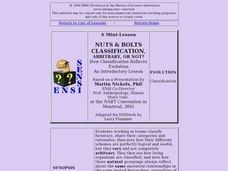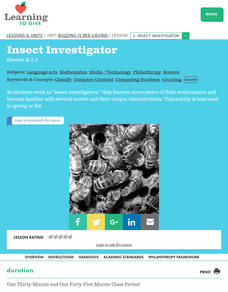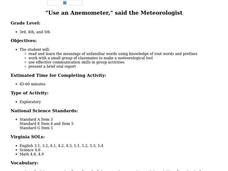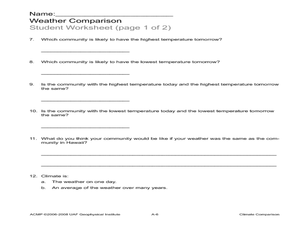Curated OER
Is Your Water Clean?
Students conduct tests of water samples from different sources, such as a local river, tap water, and an irrigation ditch. After determining which pollutants are present in each sample, students hypothesize the possible sources of the...
Curated OER
Roaming Biomes
Students use the Internet to research the capabilities of earth-observation satellites. Using the information, they write a report on how remote-sensing technology is used to measure the impact of climate change. They identify the...
Curated OER
I Did It!
Second graders choose a "positive work habit name" and explain why they choose the selected name. They share self-assessment information about their work habits and progress from week to week. Students respond with, "I did it" anytime...
Curated OER
Space Presents Problems
Students use the internet to research problems related to space. They complete a questionaire to direct their research before beginning. They create a database of moon and planet characteristics.
Curated OER
Olympics
Young scholars rotate through a variety of Olympic activities and record their results. Teams rotate through stations and practice units of measurement.
Curated OER
The Surprise of the Blue Water
Students become aware of factors that effect drinking water quality and how this could effect the health of their school environment. Students compose a business letter reporting their school water quality results to an appropriate...
Curated OER
Nuts & Bolts: is Classification, Arbitrary, Or Not?
Students, in groups, classify furniture, share their categories and rationales, then note how their different schemes vary, perfectly logical and useful, but completely arbitrary.
Curated OER
Turtles
Pupils discuss turtles. They read books about turtles, make turtle puppets, research turtles on the Internet and then create a turtle fact booklet.
Curated OER
100 Remarkable People
Students investigate a variety of important historical figures in order to present a report to the class. The use of internet research skills is reinforced for the beginning of the lesson and culminates in an oral presentation of the...
Curated OER
Let's Get To the Core!
Students practice analyzing ice core samples to discover climate changes. Using the samples, they identify and graph the gas amounts. They use these numbers to determine their effect on global warming. In pairs, they complete a...
Curated OER
Insect Safari
Third graders name and identify three body parts of an insect, identify the characteristics that insects have six legs and one pair of antennae and categorize insects as to whether they are helpful or harmful.
Curated OER
Computer Science: Pendulum
Students investigate the basic properties of pendulums as a function of spreadsheets. Working in groups, they measure the period for a pendulum at six different lengths and record the results. They prepare a file using Microsoft Excel...
Curated OER
Give Me Energy
Learners explore kinetic energy. In this energy lesson students complete an activity and explain what happened.
Curated OER
Craters!
Eighth graders examine the formation of craters. In this craters lesson, 8th graders discover the various energies involved in the formation of a crater, where you can find a crater in the Solar System, and observations of craters on the...
Curated OER
Neuroscience for Kids - Sidedness
Students participate in a study to determine whether they are ruled more by the left or the right side of their brain.
Curated OER
Insect Investigator
Young scholars examine and identify common insects. They observe these insects in their environment and keep track of how many they see. They use magnifying glasses and special hats to get into the role of an inspector.
Curated OER
STABLE ANGLES OF SLOPES
Students conduct an experiment using soil and shoeboxes to explore factors controlling and affecting the slope of a hillside. They analyze angles, surfaces, etc. to gain an understanding of instability of slopes.
Curated OER
"Use an Anemometer," said the Meteorologist
Students participate in an hands-on construction of an instrument to measure wind speed.
Curated OER
Ugh! We DRINK This Stuff?
Young scholars explain the processes involved in the cleansing and purifying of surface water. After a lecture/demo, students engage in an experiment that illustrates how water is cleansed before we drink it.
Curated OER
"Use an Anemometer," said the Meteorologist
Students work in groups to make an instrument the Meteorologists use to measure the speed of the wind after the teacher reads them a poem about the wind. Students then review vocabulary that they studied from their lesson plan.
Curated OER
Database in Social Studies
Fourth graders search a database for information on North Carolina lighthouses and Old Mills. Using their research, 4th graders generate further questions on these subjects and then research the answers.
Curated OER
Climate Comparison
Learners explore climate regions. In this climate lesson, students examine the climate regions of Alaska as well as the state of Hawaii. Learners research selected Internet sources to gather information regarding the climates present in...
Curated OER
The Design Process
Students work together to construct a foundation of nine 3" x 5" index cards to support their 9" textbook off their desk. They summarize the steps used to solve the problem and discuss and compare their solutions. They then complete the...
Curated OER
Edible Plants
Students determine what part of a plant they are eating when they eat different fruits and vegetables.

























